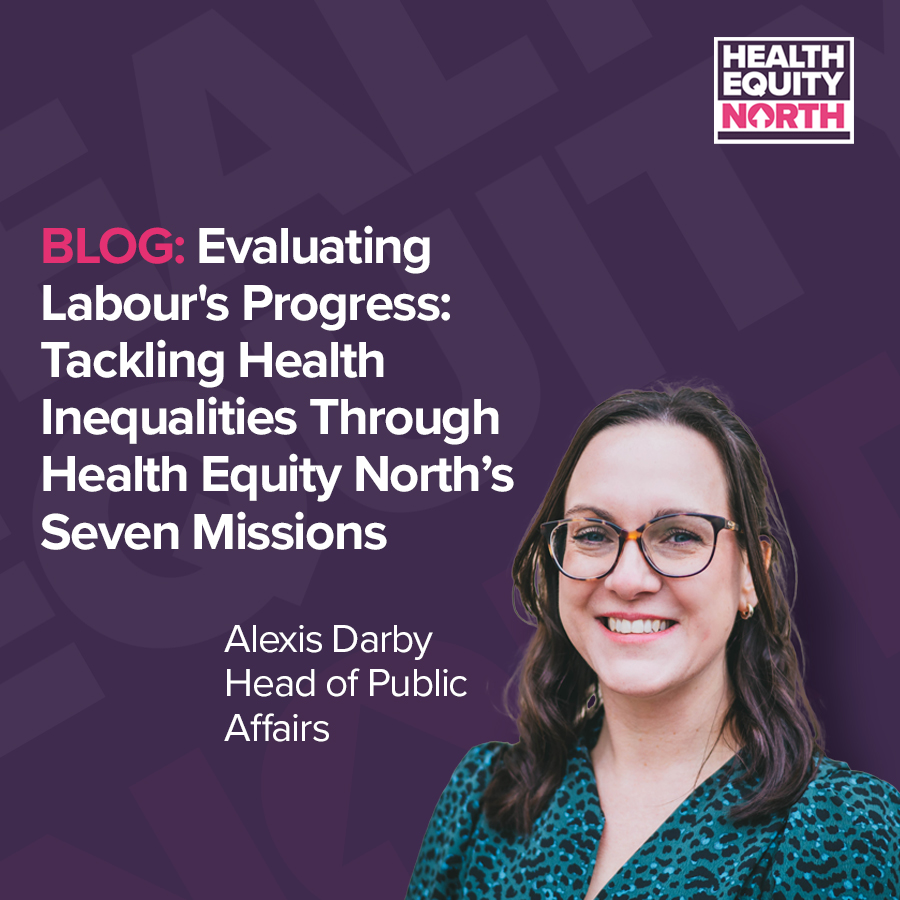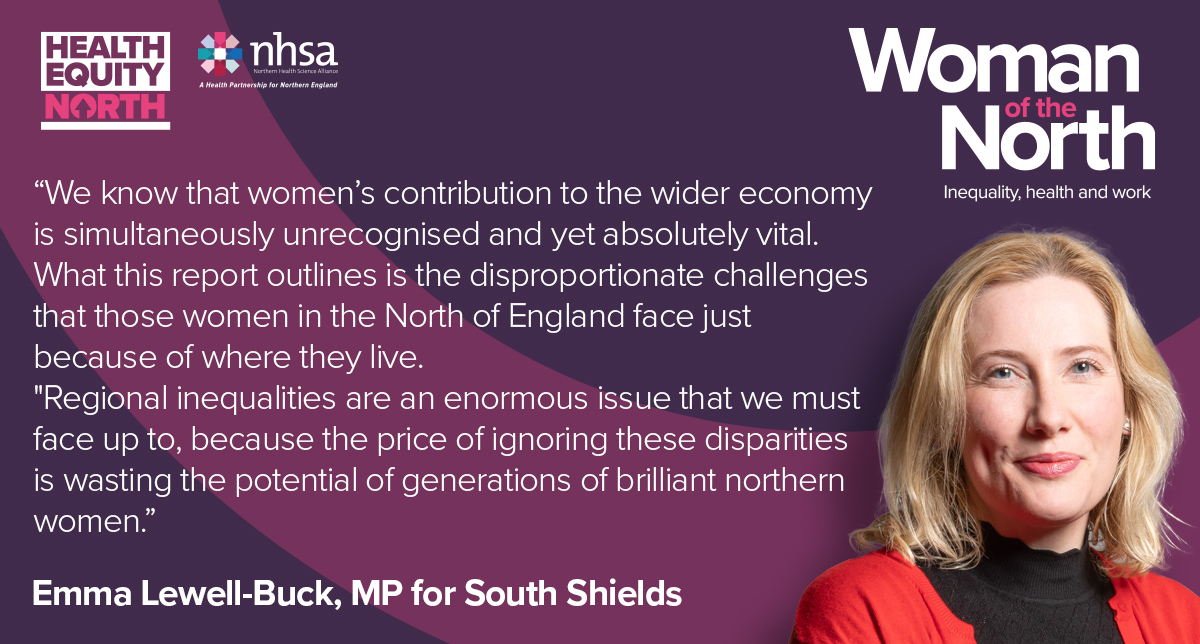Evaluating Labour’s Progress: Tackling Health Inequalities Through Health Equity North’s Seven Missions

Since coming to power last year, the Labour Government has articulated its commitment to “Building an NHS fit for the future,” outlining clear challenges faced by the health service. While strides have been made to create a more efficient and cost-effective NHS, questions remain about the government’s effectiveness in addressing entrenched health inequalities and prioritising prevention. This blog examines the Labour Government’s progress against the Health Equity North’s (HEN) seven missions, and highlights our own efforts to drive policy change.
Mission One: Create a national strategy to reduce health inequalities
The goal of this mission is ambitious but achievable: reduce the health gap between the most deprived areas and the national average by 10% over a decade. Evidence demonstrates that addressing education, poverty, productivity, and employment could unlock £13.2bn in economic growth by levelling up the North’s health outcomes.
Key Actions:
This week, Wes Streeting MP, Secretary of State for Health and Social Care, announced a 10 Year Health Plan that will focus on strategic shifts to tackle health inequalities as part of the NHS’s ‘road to recovery’.
Labour pledged in their manifesto to halve the gap in healthy life expectancy between the richest and poorest regions in England. Policies include the implementation of the Tobacco and Vapes Bill and a ban on junk food TV advertising before 9pm starting in October this year.
Broader initiatives include the “Back to Work” action plan, enhanced employment rights, plans to improve social housing, and the anticipated findings of the Child Poverty Taskforce set to be published this spring.
Health Equity North Academic Co-Director, Professor David Taylor-Robinson from University of Liverpool published research in the BMJ highlighting a 20-fold increase in susceptibility to diseases like measles in deprived areas. Our team has spotlighted regional disparities in community resilience and forged partnerships with Metro Mayors to stimulate economic growth for the North.
Mission Two: Tackle poverty through evidence-based policies
Our second mission focuses on reducing poverty, especially child poverty, as a critical way to improve health outcomes over the life course. Our research underscores the need to:
- Commit to ending child poverty
- Scrap the two-child cap on Universal Credit
- Increase child benefit
- Eliminate the five-week wait for Universal Credit.
Key Actions:
The Labour Government has established the Child Poverty Taskforce which aims to oversee the development and publication of a cross-government child poverty strategy to reduce and alleviate child poverty. We eagerly await the findings due to be published in the spring.
We were delighted to see that North East Mayor Kim McGuinness has pledged to tackle child poverty in the region, measuring every investment decision against the impact on child poverty – we hope to see more Metro Mayors and the Government follow this.
At Health Equity North we continue to advocate for solutions to poverty, by speaking at events and in the press about the harm poverty causes, along with our academic co-directors publishing an article in The BMJ setting out why the benefit cap is damaging for child health.
Mission Three: Give children in the North enough food of good quality
Good nutrition is fundamental for lifelong health. We recommend:
- Auto-enrolling all eligible pupils for Free School Meals (FSM).
- Extending FSM to all children on Universal Credit.
- Automatically enrolling eligible families into the Healthy Start Scheme.
Key Actions:
While the government’s commitment to free breakfast clubs starting in April 2025 is a welcome step, a long-term commitment to FSM is essential for the well-being and development of children.
Mission Four: Give people warm homes of a good standard
A warm, safe home is essential for health. We advocate for:
- Financial support for vulnerable groups, including carers and low-income households.
- Improved insulation and energy efficiency measures.
Key Actions:
The governments Warm Homes Plan is part of their clean energy pledge which will offer grants and low-interest loans to support investment in insulation and other improvements such as solar panels, batteries and low-carbon heating to cut bills. The renters reform bill will require landlords by law to carry out repairs and improvements so tenants’ living standards are safe from hazards which is also key to their overall health.
In the regions North East Mayor Kim McGuinness has pledged to reform social housing in the region and West Yorkshire Mayor Tracy Brabin has promised to begin a programme to insulate every social home in West Yorkshire .
At Health Equity North we have contributed to a report by the Town and Country Planning Association titled “Raising the healthiest generation in history: why it matters where children and young people live”, an evidence based inquiry into children, young people and the built environment .
Mission Five: Support communities and families to access health and social care easily
Our fifth mission calls on the Government to fund family hubs in deprived areas and leverage community assets to improve access to care across all life stages.
The Government has Launched the Lord Darzi investigation which will look into the state of the NHS and what can be improved. Chapter 4 of the report covers health inequalities and the impact of poverty. However, there is no mention of Family Hubs or any known plans to expand Family Hub Programmes.Concerns are growing that the NHS’s previous pledge to establish a women’s health hub in every region may not be renewed in the 2025-26 guidance. Alarmingly, only 11 out of 42 NHS Integrated Care Boards (ICBs) have implemented dedicated women’s health hubs—a significant and troubling setback.
In the North, Metro Mayor for South Yorkshire, Oliver Coppard has pledged to establish a South Yorkshire Digital Health Innovation Hub, using cutting edge technology to solve health problems across South Yorkshire and to work with councils and the NHS to improve hospitals and healthcare facilities and access, bringing healthcare closer to South Yorkshire communities.
Mission Six: Fund schools in the North of England fairly
Our research shows that schools are on the frontline in combatting mental health issues and supporting pupils’ wellbeing. We called on government to immediately implement changes to the National Funding Formula to offer more support to schools in deprived areas, taking into account historic under-funding of schools in the North of England.
While we have been pleased to see the Chancellor, Rachel Reeves pledged £2.3bn extra to fund schools, there has been no mention of closing the inequity gap
Mission Seven: Give people in communities that are not often consulted a voice
Our final mission advocates including diverse voices in policymaking to ensure the needs of underrepresented groups, particularly children, are met. We advocate for:
- Children’s Rights Impact Assessments.
- Devolved Citizens’ Assemblies to represent regional voices
So far there has been no commitment from the Labour Government on either of these initiatives.
Progress and Challenges
The Labour Government has shown genuine intent and taken promising steps to address some of the entrenched issues highlighted by the HEN’s seven missions. Their steps to reduce health inequalities and improve housing standards demonstrate a commitment to addressing the social determinants of health.
The establishment of the Child Poverty Taskforce, the introduction of the Warm Homes Plan, and regional efforts by Metro Mayors reflect a growing recognition of the need for place-based policies tailored to local challenges.
However, there are notable gaps and areas where more decisive action is required, the lack of concrete measures in critical areas like universal FSM and the Healthy Start Scheme limits the potential impact on childhood nutrition and health outcomes. Similarly, while extra funding for schools is a positive development, the failure to address the long-standing funding inequities in northern schools undermines efforts to close regional educational and health disparities.
The absence of a clear plan for Family Hubs or Women’s Hubs and the lack of commitment to using Children’s Rights Impact Assessments or Citizens’ Assemblies indicate missed opportunities to engage with communities and ensure policy decisions reflect the needs of the most vulnerable. These omissions highlight the need for a more inclusive and evidence-based approach to policymaking that prioritises the voices of marginalised groups.
Moving forward, Labour must deliver on its existing promises while addressing these critical gaps. Clear strategies to combat child poverty, close the educational funding gap, and empower communities are vital.




